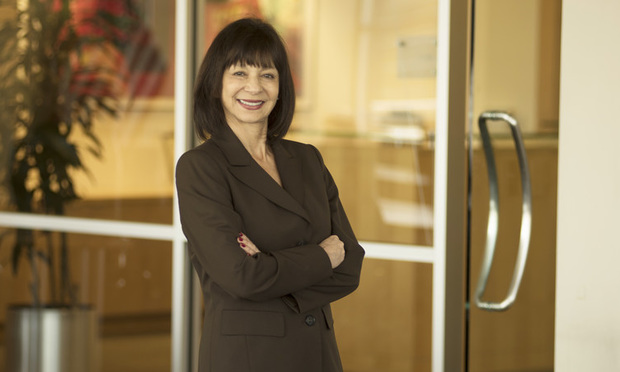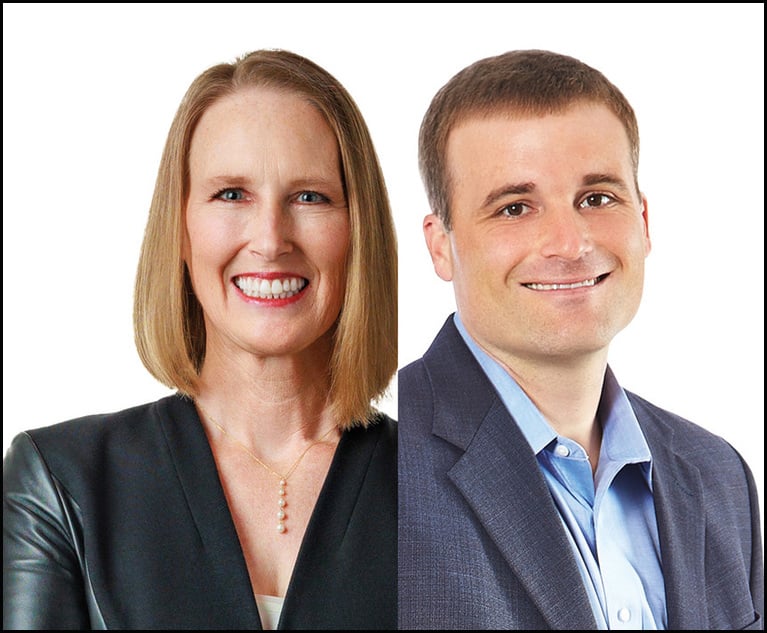Gilead, Fish & Richardson Fend Off $200 Million Merck Verdict
The Federal Circuit backed U.S. District Judge Beth Labson Freeman's finding that Merck's business and litigation misconduct justified unwinding the verdict.
April 25, 2018 at 10:33 PM
4 minute read

Gilead Sciences will not have to pay a $200 million jury award for infringing two Merck & Co. patents on hepatitis C medication. The U.S. Court of Appeals for the Federal Circuit on Thursday backed a San Jose trial judge's decision to throw out the award based on Merck's unclean hands.
U.S. District Judge Beth Labson Freeman had found that a Merck patent prosecutor breached an ethical firewall in prosecuting the company's patents, and then gave false testimony about his role at a deposition.
“Those findings establish serious misconduct, violating clear standards of probity in the circumstances, that led to the acquisition of the less risky '499 patent,” Judge Richard Taranto wrote in Gilead Sciences v. Merck.
Taranto stressed throughout his opinion that the doctrine of unclean hands is not to be invoked lightly. But in this case, Merck's conduct was “immediately and necessarily related to the equity of giving Merck the relief of patent enforcement it seeks in this litigation,” Taranto concluded.
Wednesay's decision culminates a jury trial that led to a $200 million award, a bench trial unwinding it, and then a 95-minute long oral argument before the Federal Circuit in February. In the middle of it all has been Fish & Richardson partner Juanita Brooks, who tried the case and then led an all-women team for Gilead at the Federal Circuit hearing.
“It took awhile. It wasn't necessarily a straight course, but we are very pleased with the outcome,” Brooks said Wednesday.
Jurors found that Gilead's sofosbuvir compound, an active ingredient in such medications as Sovaldi and Harvoni, infringed Merck's 7,105,499 and 8,481,712 patents. Gilead had obtained sofosbuvir with its 2011 acquisition of Pharmasset Inc. for $11 billion. By the time of trial, Sovaldi and Harvoni had rung up $20 billion in sales.
But Freeman threw out the verdict. She found that Durette had listened in with Merck's knowledge on a 2004 phone conference with Pharmasset to discuss a possible collaboration. In that call, Pharmasset disclosed the structure of the compound that would eventually become sofosbuvir.
The phone conference was subject to a confidentiality agreement and intended only for Merck employees outside of the company's HCV program. Merck had been experimenting in the same area, and Durette subsequently contributed to the '499 patent, which narrowed the range of its claims.
He swore repeatedly at his deposition that he wasn't on the phone conference—then said he couldn't remember if he was on or not. Freeman found that Durette “fabricated testimony in this case and that Merck supported that bad-faith conduct.” All of that together rendered the patents unenforceable against Gilead, Freeman ruled.
The Federal Circuit's opinion was less fiery than Freeman's, and even discounted some of the misconduct she cited. But it still ended up in the same place. “We have relied on a more limited set of wrongful conduct than recited in the district court's opinion,” Taranto wrote, “but we do not think that the equitable balance is altered by that narrowing.”
Merck's appellate counsel Jeffrey Lamken of MoloLamken had argued before the Federal Circuit that there wasn't a sufficient nexus between the misconduct and the jury verdict to justify the drastic defense of unclean hands.
Taranto wrote that the court was mindful of “the potential for misuse of this necessarily flexible doctrine.” But quoting repeatedly from Freeman's opinion, he found enough to support her decision “under the applicable deferential standard of review.”
Gilead was represented on appeal by a team of lawyers from Fish and from Orrick, Herrington & Sutcliffe. Brooks prepared for oral argument and was accompanied in the courtroom by Fish partners Elizabeth Flanagan and Deanna Reichel and by Gilead's Lori Ann Morgan and Andrea Hutchison.
“Before the oral argument, we looked at each other and realized it was an all-women team,” Brooks said.
This content has been archived. It is available through our partners, LexisNexis® and Bloomberg Law.
To view this content, please continue to their sites.
Not a Lexis Subscriber?
Subscribe Now
Not a Bloomberg Law Subscriber?
Subscribe Now
NOT FOR REPRINT
© 2025 ALM Global, LLC, All Rights Reserved. Request academic re-use from www.copyright.com. All other uses, submit a request to [email protected]. For more information visit Asset & Logo Licensing.
You Might Like
View All


TikTok Hit With California Class Action for Allegedly Mining Children's Data Without Parental Consent

Khan Defends FTC Tenure, Does Not Address Post-Inauguration Plans
Trending Stories
- 1NY Judge Admonished Over Contributions to Progressive Political Causes
- 2Legaltech Rundown: Alexi Launches an AI Litigation Tool, Hotshot Announces Private Equity Practice Courses, and More
- 36-48. It’s Comp Time Again: How To Crush Your Comp Memo
- 4'Religious Discrimination'?: 4th Circuit Revives Challenge to Employer Vaccine Mandate
- 5Fight Over Amicus-Funding Disclosure Surfaces in Google Play Appeal
Who Got The Work
Michael G. Bongiorno, Andrew Scott Dulberg and Elizabeth E. Driscoll from Wilmer Cutler Pickering Hale and Dorr have stepped in to represent Symbotic Inc., an A.I.-enabled technology platform that focuses on increasing supply chain efficiency, and other defendants in a pending shareholder derivative lawsuit. The case, filed Oct. 2 in Massachusetts District Court by the Brown Law Firm on behalf of Stephen Austen, accuses certain officers and directors of misleading investors in regard to Symbotic's potential for margin growth by failing to disclose that the company was not equipped to timely deploy its systems or manage expenses through project delays. The case, assigned to U.S. District Judge Nathaniel M. Gorton, is 1:24-cv-12522, Austen v. Cohen et al.
Who Got The Work
Edmund Polubinski and Marie Killmond of Davis Polk & Wardwell have entered appearances for data platform software development company MongoDB and other defendants in a pending shareholder derivative lawsuit. The action, filed Oct. 7 in New York Southern District Court by the Brown Law Firm, accuses the company's directors and/or officers of falsely expressing confidence in the company’s restructuring of its sales incentive plan and downplaying the severity of decreases in its upfront commitments. The case is 1:24-cv-07594, Roy v. Ittycheria et al.
Who Got The Work
Amy O. Bruchs and Kurt F. Ellison of Michael Best & Friedrich have entered appearances for Epic Systems Corp. in a pending employment discrimination lawsuit. The suit was filed Sept. 7 in Wisconsin Western District Court by Levine Eisberner LLC and Siri & Glimstad on behalf of a project manager who claims that he was wrongfully terminated after applying for a religious exemption to the defendant's COVID-19 vaccine mandate. The case, assigned to U.S. Magistrate Judge Anita Marie Boor, is 3:24-cv-00630, Secker, Nathan v. Epic Systems Corporation.
Who Got The Work
David X. Sullivan, Thomas J. Finn and Gregory A. Hall from McCarter & English have entered appearances for Sunrun Installation Services in a pending civil rights lawsuit. The complaint was filed Sept. 4 in Connecticut District Court by attorney Robert M. Berke on behalf of former employee George Edward Steins, who was arrested and charged with employing an unregistered home improvement salesperson. The complaint alleges that had Sunrun informed the Connecticut Department of Consumer Protection that the plaintiff's employment had ended in 2017 and that he no longer held Sunrun's home improvement contractor license, he would not have been hit with charges, which were dismissed in May 2024. The case, assigned to U.S. District Judge Jeffrey A. Meyer, is 3:24-cv-01423, Steins v. Sunrun, Inc. et al.
Who Got The Work
Greenberg Traurig shareholder Joshua L. Raskin has entered an appearance for boohoo.com UK Ltd. in a pending patent infringement lawsuit. The suit, filed Sept. 3 in Texas Eastern District Court by Rozier Hardt McDonough on behalf of Alto Dynamics, asserts five patents related to an online shopping platform. The case, assigned to U.S. District Judge Rodney Gilstrap, is 2:24-cv-00719, Alto Dynamics, LLC v. boohoo.com UK Limited.
Featured Firms
Law Offices of Gary Martin Hays & Associates, P.C.
(470) 294-1674
Law Offices of Mark E. Salomone
(857) 444-6468
Smith & Hassler
(713) 739-1250






